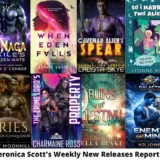
Publishing. It’s been experiencing a revolution, and for a time, no one was quite sure where it was going…especially for traditional publishers. They were using outdated business models that involved printers, shippers, wholesalers, distributors, marketers, and booksellers, all of whom took a cut. And those writers who chose to forgo this process and self-publish (also known as vanity publishing) were frowned upon by the “establishment.”
But as self-publishing success stories proliferated, it started to become less stigmatized and more authors were willing to dip their toe in the pool. Writers were beginning to take control from the publishers—control over format, pricing, publication dates, type of content, and other areas.
“The revolution of digital publishing has leveled the playing field for writers,” says Ron Gavalik, creator of the Emotobooks™ format and self-publisher of Grit City Books. “But it requires us to use new technologies to garner readers.”
One of those technologies is Amazon. Amazon provides a platform for authors to display their books, and for customers to write reviews and rate books. Amazon began forcing the big-box bookstores out of business, and the advent of e-books just hurried the process along. In a “fight or flight” response, traditional publishers had to develop new business models just to compete. They needed a way to publish more simply and at lower cost. Enter digital imprints.
An imprint for a traditional publisher is a trade name under which certain types of books are published and can be used to segment the market. For example, Harlequin LUNA is an imprint of Harlequin romance for fantasy-related stories. Harlequin TEEN appeals to adolescents.
A digital imprint is a trade name that publishes only electronic forms of media. And the traditional publishing houses have developed several of them in response to the changing market.
Random House has developed the digital imprints Alibi for mystery/thriller/suspense stories; Hydra for science fiction and fantasy, Flirt for New Adult; and Loveswept for contemporary romance. The imprints offer two remuneration models:
- Profit share model—No advance is given the author. The imprint and author share profits 50-50 from the first copy sold. “Profit” is defined as net sales revenue minus deductions for print editions (actual costs directly attributable to production and shipping of the book). For digital editions, Hydra, Alibi, Loveswept, or Flirt will cover the cost of production. For both print and digital editions, Hydra, Alibi, Loveswept, or Flirt will cover all marketing costs connected with general, category- or imprint-wide marketing programs.
- Advance plus royalty model—Authors are given a more traditional publishing arrangement, with Random House’s standard eBook royalty of 25 percent of net receipts. The imprint will cover production, shipping, and marketing for all formats at 100 percent of cost.
However, the imprints acquire the rights to every book for the term of copyright, which is for the life of the author plus 70 years. Essentially, you’re selling all your rights, unless your book fails to sell a certain number of copies. If you’re a writer, be sure to carefully consider the terms of the contract before signing on the dotted line.
HarperCollins takes a slightly different approach with Authonomy. It’s a website where writers post works of at least 10,000 words and other writers comment on or rate them. HarperCollins publishers review the site for the most popular works, and then work with those authors toward publication. HarperCollins has also recently announced a romance digital imprint, Impulse.
Harlequin books is launching the romance digital imprints The Harlequin, Harlequin TEEN, Harlequin MIRA, and Harlequin HQN. Harlequin also recently announced that it will establish Harlequin E, an imprint to focus on mystery, romance, erotic romance, young adult, fantasy, fantasy romance, sci-fi, and sci-fi romance categories.
Other publishers have joined the digital bandwagon, as well. Penguin has announced that it is reviving the Dutton Guilt Edged Mysteries line as a digital imprint, Kensington has launched eKensington as a digital imprint, and F+W Media is moving its Crimson Romance e-book imprint from a beta test to full launch.
Profound changes in the publishing industry were brought on by technology, an external force; but these changes will be furthered by a desire for profit, an internal force. The proliferation of digital imprints demonstrates that the platform is here to stay, at least until the next big thing comes along. Direct-to-brain upload anyone?
Note:
Bonus points to anyone who can name the episode this quote came from: “Brain and brain! What is brain?”









So here’s the problem I have with “digital imprints.” What are they giving you that you can’t get on your own? The answer is nothing (except maybe their name on your virtual spine). In the world of print publishers are needed for many reasons:
* Distribution channels (Getting into bookstores, libraries, Target, etc)
* Print runs required to decrease the unit cost per book
* Sales forces – to get the books on the shelves widely
But in a digital world, I have just as much “pull” on sites like Amazon, B&N.com, Kobo, and the ibookstore. These sites have some co-op opportunities (where a book will get special treatment like a Kindle Daily Deal or showing up on the Featured page in ibookstore). But for the most part, the thing that drives the majority of a books visibility is sales. The more books moved, the more lists you show up on. With a lot of high rated reviews – then you get higher in the “popularity list” and also show up on the “top rated” lists.
Cover design, layout, and editing can easily be purchased via the same freelancers that the digital publishers are using. Yes, you’ll have to front 100% of that cost – but you’ll earn 100% of the profit. Is the $2,000 – $6,000 worth of investment worth giving up 50% of your income FOREVER?
And what’s more…you lose a great deal.
* No control over price
* No control over bundling
* No control if your book will be in the MatchBook Program
* No control over ebook library distribution
* No control over enrollment in programs like Oyster
* No control over foreign territory distribution (I lost distribution in many countries when I moved from self to trad)
That’s a lot to give up and very little to get. I can’t really think of any “digital only” deal that would be good for the author – but I’m open to be hearing others takes on the subject as I’d be more than happy to adjust my opinion if a good case can be made.
It strikes me that many of these kinds of “services” (certainly not all) that have sprung up along with the epublishing revolution are in many ways a substitute for the kind of validation that an author receives when having a book picked up by a traditional publisher – an artificial gatekeeper, if you will.
I’ll add a bit to Michael’s take: I’ve worked in intellectual property formally for 11 years, managing a patent, trademark, copyright and trade secret portfolio for an R&D firm. I continue to perform those same functions for myself – especially in regards to Amazing Stories.
There is one and only one hard and fast rule for any and all IP: NEVER give up your control. Never. This may certainly mean that you must forego opportunities that are attractive, or that solve a current financial shortfall, but you will almost always come to regret it. If nothing else, consider that by giving up control, you are essentially saying that your IP is valueless.
Of course, like anything else, there are exceptions to this rule. If, for example, someone were to offer me oh, say, 10 million dollars and a 15% stake AND signed an ironclad contract (no such thing) that guaranteed that my vision for Amazing Stories would be retained and implemented by the buyers, I ‘might’ consider the offer. (And that’s not idle almost wish-fulfillment: I have foregone multi-million dollar deals several times in the past because the deal was not right – I had to give up control.)
That small bit of validation – is the only thing being offered – and I think that these digital imprints will probably be publishing more of “minor league” material such that a self-published author may move from one stigma pool to the other.
To say “never give up control” means never sign any publishing contract as that is exactly what you give up…and with today’s technology (ebooks and pod) the likelihood of losing it forever (well at least to 70 years past your death) are high. The “life of copyright” isn’t just something being asked for by these digital contracts – it is the term for all big-five contracts as well.
I agree that life of copyright is an outrageous demand, and if the big-five are asking for them as well, it seems self-publishing will really be the way to go. Writers definitely need to learn to become self-advocates and not rely on someone else’s legal department to set or interpret contract terms. The thing is, many writers just like to write, and don’t want to be bothered with marketing, social media posts, appearances,and so forth. So, perhaps for them, giving up control is worth not having to deal with all that.
Some groups of writers are starting their own ‘houses’ where they write, publish, advertise, and support one another’s work. And that may trend as more writers refuse to surrender life of copyright.
Ding ding! Correct!
Yes, it’s a changing publishing landscape. Good for writers I suppose, but I am still partial to reading the old fashioned way. I’ll pass on the direct-to-brain upload and go straight for the bonus question – Spock’s Brain.